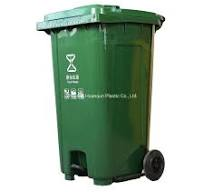By: Yahaya YAKUBU (Dr)
Few names are as prominent and impactful in Ghana’s journey towards a cleaner, more sustainable environment as the Jospong Group of Companies.
Through its subsidiary, Zoomlion Ghana Limited, and other strategic ventures, the Jospong Group has led the country’s waste management revolution, offering comprehensive solutions for waste receptacle provision, transportation, treatment, and final disposal across all segments of society.
This article delves into the pivotal role played by the Jospong Group, outlining the range of containers, equipment, and services deployed across homes, public spaces, schools, healthcare institutions, markets, and industries.
Waste Receptacles: Customized Solutions for All
A key feature of the Jospong Group’s intervention is the supply of a wide array of waste receptacles tailored to the diverse needs of different sectors.
Households
240-Litre Waste Bins: Popularly seen in homes across urban and suburban Ghana, these durable plastic bins are equipped with wheels for easy mobility.

Smaller Bins (50-120 Litres): Targeted at small households and apartments.
Waste Segregation Bins: For modern homes advocating recycling, colour-coded bins (green for organic, blue for plastics, yellow for metals) are increasingly available.


50 L 120 L
Public Spaces and Markets
660-Litre Mobile Skips: Positioned in marketplaces, lorry stations, and parks to handle higher volumes of waste.

Communal Containers (1,100-Litre Bins): Heavy-duty bins for larger public spaces.

Street Litter Bins (60–100 Litres): Installed on pedestrian walkways, bus stops, and recreational parks.


60 Litres 100 Litres
Institutions (Schools, Hospitals, Offices)
Pedal Bins (30-60 Litres): Especially common in healthcare facilities for sanitary waste collection.

Biohazard Waste Bins (Red and Yellow bins): Used in hospitals for infectious and sharps waste.
Recycling Stations in Schools: Promoting environmental education with bins labelled for paper, plastic, and cans.
Industrial and Construction Sites
Roll-on Roll-off (RoRo) Containers (16m³): Heavy-duty containers for bulky waste from factories and construction activities.

60 m3 RoRo Container
Hazardous Waste Containers: Specially designed containers for industrial chemical and hazardous waste.
Waste Transportation: Modern Fleet and Logistics
Efficient transportation is critical to a functioning waste management system, and the Jospong Group has invested significantly in modern equipment.
Fleet Highlights
Compactor Trucks: These vehicles compress waste, maximizing transport efficiency. Zoomlion operates hundreds of these across Ghana.

Skip Trucks: Used for lifting and transporting large 12m³ and 18m³ skip containers, especially from marketplaces and commercial zones.

Tippers and Dump Trucks: Transporting construction and bulky industrial waste.

Motorized Tricycles (Tricycles/‘Aboboyaa’): Deployed in hard-to-reach communities and inner-city enclaves.

Sanitation Motorbikes: Introduced to swiftly manage waste in densely populated and traffic-prone urban centres.

Vacuum Tankers: Specialized trucks for the evacuation and transportation of liquid waste (sewage and sludge).

The Jospong Group has also established strategic waste transfer stations in cities like Accra and Kumasi, serving as interim holding points to optimize long-distance waste haulage.

Africa’s First Waste Transfer Station, located at Teshie (ZoomPak)
Waste Treatment: Innovation at Work
Beyond collection, Jospong has spearheaded innovations in waste treatment to enhance environmental sustainability and create economic opportunities.
Treatment Facilities
Integrated Recycling and Composting Plants (IRECOP): Located in Accra and Kumasi, among others, these plants separate organic waste for composting and recover recyclable materials like plastics, metals, and paper.

Medical Waste Treatment Plants: Equipped with autoclaving and incineration technologies, these facilities ensure the safe disposal of biomedical waste from hospitals.

Faecal Sludge Treatment Plants: Installed in urban centres like Accra and Tema to safely treat liquid waste, converting it into biofertilizer and biogas.

Waste Disposal: Safe and Sustainable Methods
Jospong Group’s waste management chain culminates in the responsible disposal of residual waste materials that cannot be recycled or composted.
Disposal Facilities
Engineered Sanitary Landfills: Located in areas such as Kpone (Greater Accra Region) and Kumasi (Ashanti Region), these landfills prevent groundwater contamination and gas emissions.
Controlled Dumpsites: In smaller towns, upgraded controlled dumpsites are operated while long-term landfill solutions are planned.
Leachate Treatment Plants: Installed at landfill sites to treat the potentially harmful liquid that percolates through waste, ensuring environmental protection.
Addressing All Segments of Society
The Jospong Group’s approach is notable for being inclusive, ensuring waste management solutions are accessible across:
Urban and Peri-Urban Areas: From Accra’s business districts to growing suburbs.
Rural Communities: Special adaptations such as tricycles and communal skips.
Special Events: Temporary bins, mobile toilets, and rapid response clean-up teams for concerts, political rallies, and festivals.
Disaster and Emergency Areas: Provision of sanitation services in areas affected by floods and public health crises.
Conclusion
Through a holistic, end-to-end waste management model, the Jospong Group of Companies has fundamentally transformed Ghana’s sanitation landscape.
By delivering tailored receptacles, cutting-edge transportation logistics, innovative treatment solutions, and environmentally safe disposal systems, the Group supports government initiatives like the “Clean Ghana Campaign” and the broader Sustainable Development Goals (SDGs).
Their investments have not only improved public health and environmental quality but also generated employment opportunities for thousands of Ghanaians across the country.
As Ghana looks forward to building greener cities and achieving a circular economy, the strategic role of Jospong Group remains indispensable — a true partner in the nation’s quest for environmental sustainability.










